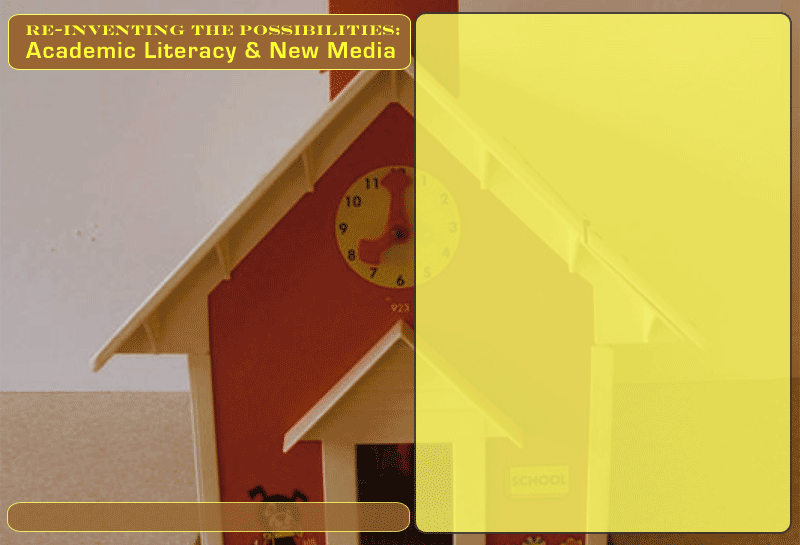Written Outcomes
The information in this node is taken from the Writing
Program Administrators Outcomes Statement for First-Year Composition (WPA
Council, 2000) in order to make a comparison between what a general-education
curriculum that focuses on writing would look like (discussed here) versus
one focused on new media (discussed elsewhere).
We should note that others (see Shipka, 2005) have done excellent
work on establishing the possibilities of using the WPA Outcomes as a guide
for multimodal composition strategies in first-year composition classes.
Our intention is to build on that work and suggest digital, compositional
strategies that showcase new media adaptations of the WPA goals. Also, the
WPA Council has recently drafted a Computer Literacy section, which is under
discussion to be considered as an addenda to the four sections of the outcomes
statement below. As of this writing/revision (August 2007), the statement
has not been officially added and so we do not discuss it here.
Rhetorical Knowledge
By the end of first-year composition, students should
- Focus on a purpose
- Respond to the needs of different audiences
- Respond appropriately to different kinds of rhetorical situations
- Use conventions of format and structure appropriate to the rhetorical
situation
- Adopt appropriate voice, tone, and level of formality
- Understand how genres shape reading and writing
- Write in several genres
Faculty in all programs and departments can build on this preparation
by helping students learn
- The main features of writing in their fields
- The main uses of writing in their fields
- The expectations of readers in their fields
Critical Thinking, Reading, and Writing
By the end of first-year composition, students should
- Use writing and reading for inquiry, learning, thinking, and communicating
- Understand a writing assignment as a series of tasks, including
finding, evaluating, analyzing, and synthesizing appropriate primary
and secondary sources
- Integrate their own ideas with those of others
- Understand the relationships among language, knowledge, and power
Faculty in all programs and departments can build on this preparation
by helping students learn
- The uses of writing as critical-thinking methods
- The interactions among critical thinking, critical reading, and
writing
- The relationships among language, knowledge, and power in their
fields
Processes
By the end of first year composition, students should
- Be aware that it usually takes multiple drafts to create and complete
a successful text
- Develop flexible strategies for generating, revising, editing, and
proofreading
- Understand writing as an open process that permits writers to use
later invention and rethinking to revise their work
- Understand the collaborative and social aspects of writing processes
- Learn to critique their own and others' works
- Learn to balance the advantages of relying on others with the responsibility
of doing their part
- Use a variety of technologies to address a range of audiences
Faculty in all programs and departments can build on this preparation
by helping students learn
- To build final results in stages
- To review work-in-progress in collaborative peer groups for purposes
other than editing
- To save extensive editing for later parts of the writing process
- To apply the technologies commonly used to research and communicate
within their fields
Knowledge of Conventions
By the end of first year composition, students should
- Learn common formats for different kinds of texts
- Develop knowledge of genre conventions ranging from structure and
paragraphing to tone and mechanics
- Practice appropriate means of documenting their work
- Control such surface features as syntax, grammar, punctuation, and
spelling
Faculty in all programs and departments can build on this preparation
by helping students learn
- The conventions of usage, specialized vocabulary, format, and documentation
in their fields
- Strategies through which better control of conventions can be achieved
Go back to the
last node.
